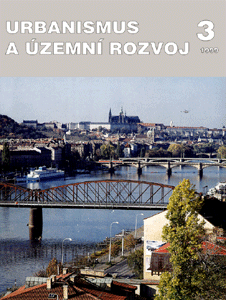
The Orientation of Europe's Housing Research, by Alois Andrle
The sufficiency and quality of housing play crucial roles in political programmes of all European governments, no matter how situations in individual countries vary. This corresponds with the public opinion on housing as an essential part of the living standard, which can also be seen in the Czech Republic. Housing has its quantity and quality, the former being the result of current construction activities, the latter of the level of equipment of the housing fund. Moreover, the construction of flats is often associated with the overall economic situation in the country as an indicator of current and future developments.
Institute for Spatial Development's Participation in the INTERREG IIC project, by Zdeněk Přikryl
In the framework of its international co-operation, the Brno Institute for Spatial Development (ISD) was invited to participate in the INTERREG IIC project, advertised by the EU. The project's aim is to materialize the European Spatial Development Perspective (ESDP, EUREK), on which we have reported (see 2/99 issue). There are various branches of INTERREG IIC (partial projects), and they are carried out throughout Europe. The principles are that the managing office be in an EU country and non-EU countries participate. ISD was invited to contribute to two branches of the project by two German institutions, Akademie für Raumforschung und Landesplanung- ARL of Hannover and Institut für ökologische Raumentwicklung - IÖR of Dresden. Both are subordinates of the German INTERREG IIC secretariat, located at the IÖR. The article gives information on both assignments.
Internal Migration 1991−1997, by Motives, by Vladimír Srb
Migration is nowadays a topic for politicians, economists, demographists, sociologists and experts in humanities, on a regional and national scale all over the world. In the Czech Republic, the volume, intensity, and directions of migration are being changed, mainly for economic reasons. We have seen a gradual decrease of the volume of internal migration since 1990 (267 222 people) through 1992 (247 930) down to 1996 (195 554), and a slight increase in 1997. The intensity indicator decreased from 25.8 migrants per 1000 inhabitants (1990) to 19.1 (1997). The migration index per settlement went down from 65.1 to 31.6 migrants during this period.
Spatial Viewpoints of the 2001 Census, by Alois Andrle & Jan Müller
The population census, to be carried out on 1 March 2001, will give us actual data on the population, the housing fund, and the housing itself, both in a nation-wide context and in that of spatial development. Today's intercensal demographic surveys are being able to specify the number of inhabitants and their sexes and age, even by individual municipalities, but we cannot evaluate intercensally the number and the characteristics of houses, not speaking about flats. The inventory-making of these items must therefore be done once a decade as one of the most important goals of censuses. Not even the population can be monitored precisely as for some characteristics of families and households. This is another reason for the existence of demographic censuses, although the Eurosat or the UN Statistical Office have started to think of cancelling them, intending to substitute the censuses by population registers and housing fund registers. It is however doubtful whether this change is going to happen soon (the year 2010 is under consideration), as the maintenance and updating of these registers is a costly business.
Remarks to Prague's Master Plan Draft, by Vojtěch Matějka
On 17 June, one year will have passed since the issue of Prague's Master Plan Draft. No date, not even an approximate one, has so far been announced for the Draft to be approved by the deputies of the Council. The Development Department, as well as municipal and parliamentary politicians, see the main burden in a prolonged conflict about the route of the ring road in the south-east of the city. Mr Kužvart, Minister of Environment, is accused of rejecting the "long option", while the Municipal Office has decided to block any construction in the area. The approval of a solution to this problem will undoubtedly be the way out of the trouble. The south-east part of the ring road will probably be built in the middle of the next decade. So, there is enough time to produce a comparative study of the "long" and the "short" options, containing an economic evaluation, an environmental audit, and other studies, now and then suggested and approved, but often rejected.
Development Opportunities of Physical Planning in the Zlín−Otrokovice Industrial Region; Presentation of a Thesis, by Ernst Rainer & Kersten Hofbauer
The thesis is the result of two individual assignments, carried out in 1997 and 1998 by two students of urban planning at the Technical University of Graz, who stayed several times in the actual area of Zlín and Otrokovice. The information basis was obtained from investigating in archives and historic master plans and from collecting updated information in current Austrian and Czech information environment. The advisor's task was motivated by the endeavour to contribute to a creative materialization of a physical planning concept that would not be burdened with bad habits of carefree economics of the communist period, but would also be protected from the "vulgar pragmatism" of today's physical planning. The goal was to keep the least possible level of controlling the students, so that their alternative could be a really independent view from the outside. As a matter of fact, not only is some independence needed to solve specific problems but also to choose independent criteria of evaluation and ways of thinking, which may be brought here by future experts, studying in a different though European social and information environment.